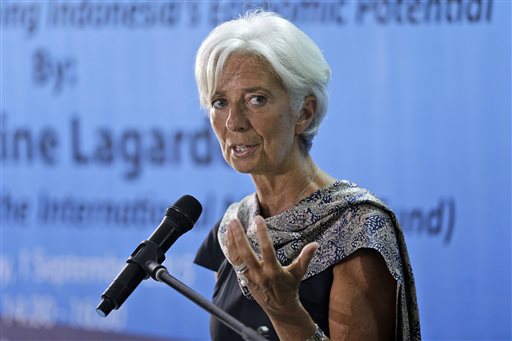
Managing Director of the International Monetary Fund Christine Lagarde gestures as she delivers her speech during a public lecture at the University of Indonesia campus in Jakarta on Tuesday, Sept. 1, 2015. On a two-day visit in the country, Lagarde said Wednesday Asian economies were doing “pretty well” despite the volatility created by China’s slowdown and unease on global financial markets. AP PHOTO/TATAN SYUFLANA
JAKARTA, Indonesia—International Monetary Fund chief Christine Lagarde said Wednesday Asian economies were doing “pretty well” despite the volatility created by China’s slowdown and unease on global financial markets.
A fresh round of volatility shook Asian and European stocks on Wednesday, as further evidence of slowing growth in China’s economy overshadowed global markets.
Financial markets have gyrated recently on the China concerns, with emerging economies and their currencies taking a beating.
Lagarde, in Jakarta for a two-day visit, said the recent turmoil highlighted the “extraordinary gains” made by Asian economies but warned further volatility was on the horizon.
“Now the situation is changing yet again, and we are all feeling the impact of China’s rebalancing and moving to a revised business model,” she told a conference.
“What has been demonstrated in the last few weeks is how much Asia is at the core of global economy, and how much disruptions occurring in one market in Asia can actually spill over to the rest of the world.”
China wants future growth to be driven more by domestic demand than by investment and exports, as in the past.
Later, Lagarde said the IMF was talking to China about its transition to a more market-determined economy, including the internationalization of its currency—a “significant” process which she hoped could be “managed in an orderly fashion.”
Slower growth in major economies like China and Japan, lower commodity prices and the prospect of higher interest rates in the United States would continue to weigh on emerging markets across the region, the IMF chief added.
To tackle the bumpy road ahead, she suggested policymakers consider reining in excessive credit growth, adopt tighter fiscal policies, use the exchange rate as a “shock absorber,” maintain adequate foreign exchange reserves and bolster regulatory oversight of the financial sector.
Despite external pressures and the slower pace of expansion in Asia, Lagarde said that “this whole region, in the world, is doing pretty well,” and would continue to be a key source of global growth.
Lagarde this week added her voice to private-sector economists who have cut their world growth estimates, conceding growth would likely be weaker than the 3.3 percent estimate the IMF published just two months ago.

